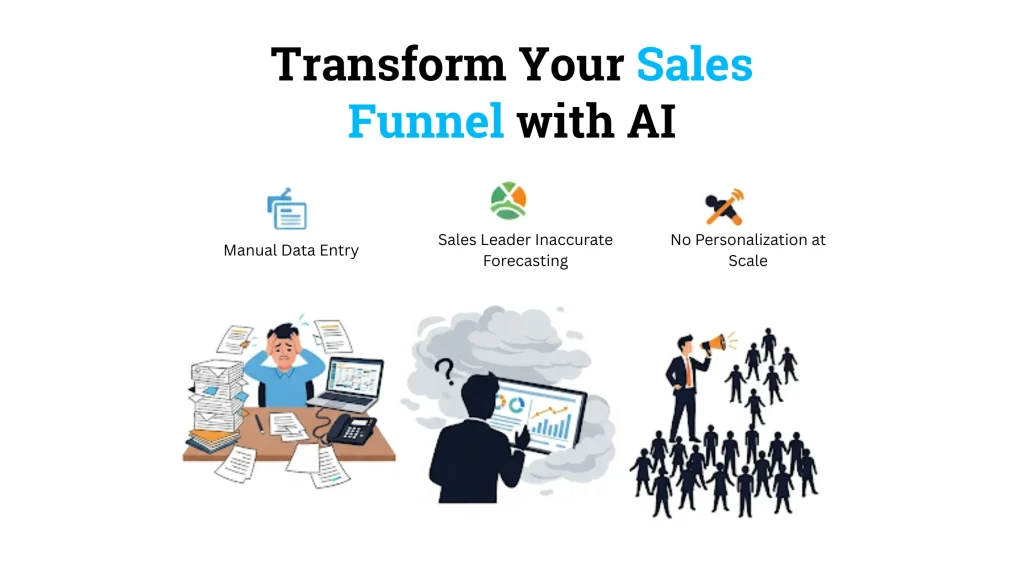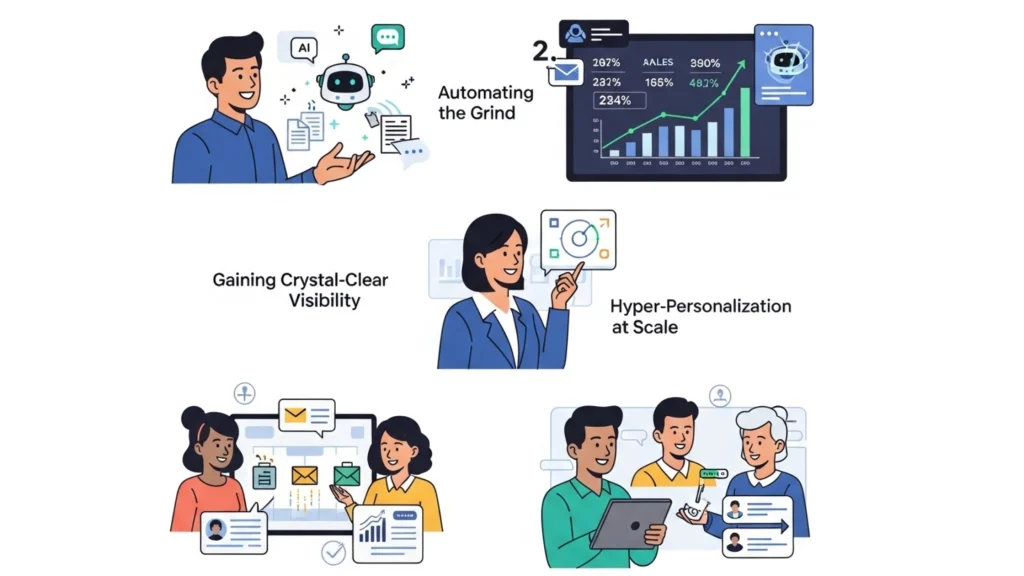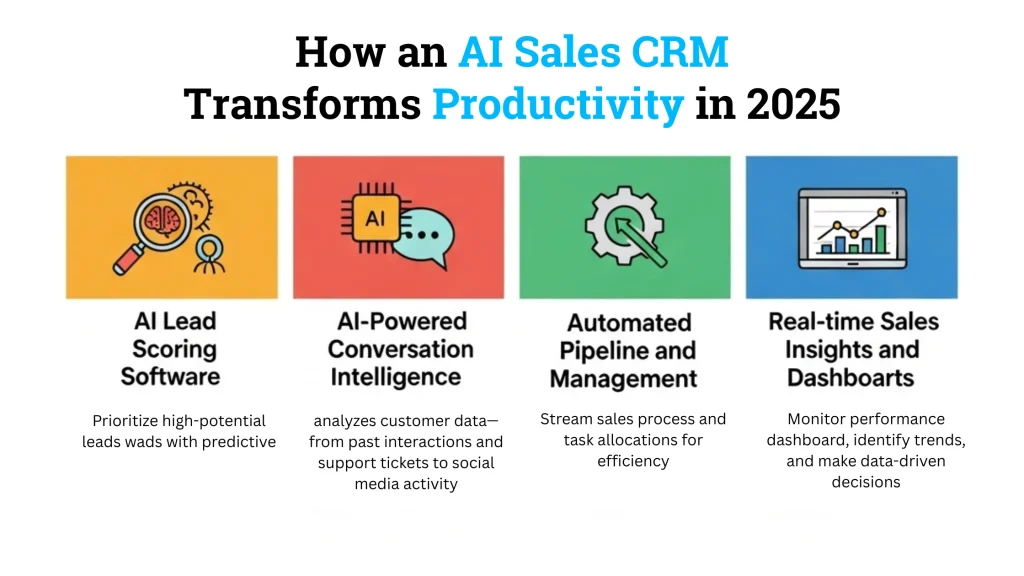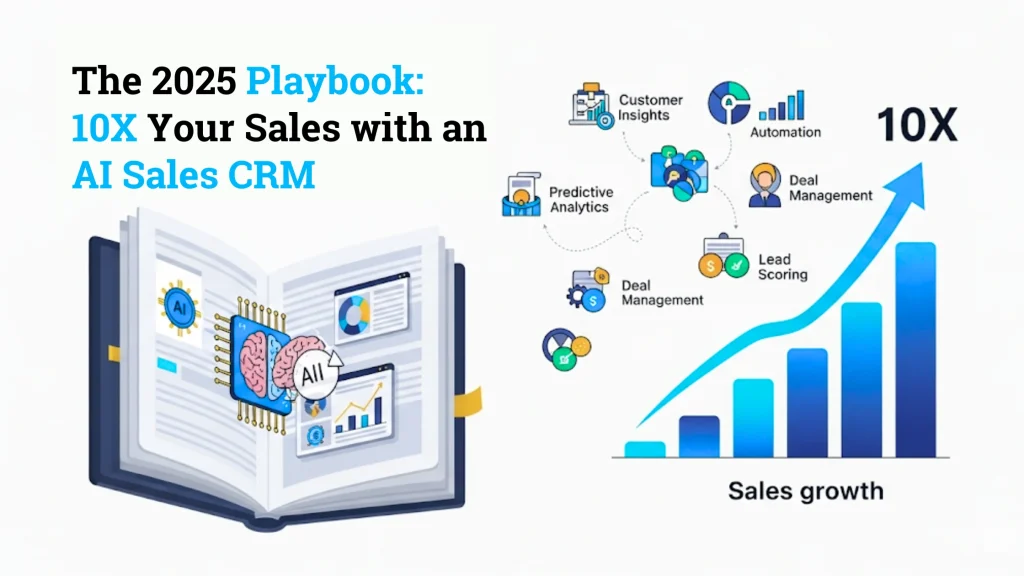The 2026 Playbook: 10X Your Sales with an AI Sales CRM
In the relentless world of sales, productivity isn’t just a metric; it’s the lifeblood of your entire operation. Yet, teams everywhere are feeling the strain.
Reps are bogged down by administrative tasks, forecasts feel more like guesswork, and personalizing outreach at scale seems impossible. If this sounds familiar, you’re not falling behind—you’re simply using an outdated playbook.
The year 2025 demands a smarter approach, one that replaces manual grind with intelligent automation. This is the definitive guide to leveraging an AI Sales CRM, the transformative technology that high-performing teams are using to redefine what’s possible in sales productivity.
The Burning Challenge: Why Traditional Sales Methods Are Failin
The digital landscape has been revolutionized, yet to the majority, old-school selling hasn’t.
Sales professionals are typically armed with outdated hardware, which takes more out of the system than it puts in, and in the process, generates a ripple effect of complications that find their way right to the bottom line.
This inefficiency is a quiet money murderer that sucks away slowly at performance and morale.

The Problem of Manual Data Entry and Repetitive Tasks
The largest time-waster for any contemporary salesperson is the daunting pile of duplicate, routine tasks.
Answering calls, searching for contact information, and sending follow-ups—these are no less unproductive actions.
A rep’s time must be devoted to relationship-building and closing deals, not typing like a clerk in a data entry shop.
When reps spend all day on paperwork, their real selling time is shortened, and this leads to lost business and burnout.
The solution is to mechanize quotidian sales drudgery through AI so the teams can focus on what they do best selling.
Inaccurate Forecasting and Pipeline Blind Spots
“How does the pipeline look?” is a question that haunts every sales leader. With traditional CRMs, the answer is often a patchwork of optimistic guesses and outdated information.
This lack of clarity makes accurate forecasting nearly impossible. Without a reliable way to predict revenue, strategic planning becomes reactive instead of proactive.
Businesses struggle to allocate resources effectively, manage cash flow, and set realistic growth targets.
The core issue is a lack of data-driven insight, leaving leaders to navigate the market with an incomplete map.
An effective AI Sales CRM addresses this by providing predictive sales analytics tools that turn uncertainty into actionable intelligence.
The Struggle for Genuine Personalization at Scale
Prospects today demand better. Mass-market, one-size-fits-all pitches fall on deaf ears. Meaningful connection is the result of deep personalization—extracting intel on a prospect’s unique needs, pains, and history.
But how does a group of ten, or hundreds, create a customized experience for thousands of leads? Not by hand; it’s not going to work.
It forces an impossible choice: bear mass with quantity and bulk outreach or bear quality with some one-off touches. Both are unscalable.
The magic of an AI Sales CRM comes into play here, where hyper-personalization is achieved without compromising on scale.

The Solution: How an AI Sales CRM Transforms Productivity in 2025
Implementing an AI Sales CRM is not a revolution; it’s a revolutionary redesign of the way the sales organization works.
It breaks through the productivity constraints of the past by bringing intelligence to every moment in the sales process.
Prospect to close, AI is a co-pilot for every sales rep, improving what they can do and optimizing their grind.
Automating the Grind: Reclaiming Hours with AI
The most apparent effect of an AI Sales CRM is automated routine, time-wasting work.
Imagine a world where call notes are captured and summarized effortlessly, follow-up emails are delivered intelligently triggered by prospect behavior, and contact records auto-complete with fresh data from anywhere on the internet without lifting a finger.
That’s not science fiction anymore. Using AI to drive tedious sales drudgery, teams can reclaim up to 30% of their workweek.
The reclaimed time is focused on high-leverage activities such as strategic planning, building customer relationships, and delicate deal negotiation, and therefore directly impacting performance.
Gaining Crystal-Clear Visibility with Predictive Analytics
An AI Sales CRM does away with guessing with mathematical certainty. Through past data analysis, behavior patterns, and thousands more indicators, its predictive sales analytics functions generate extremely accurate revenue forecasts.
Executives can finally respond decisively, “What is the best AI solution for accurate sales forecasting?”
This tech identifies struggling deals before default, selects the most promising opportunities in the pipeline, and provides data-driven recommendations on the next best action on each lead.
This produces a clean and reproducible engine of revenue and allows businesses to make more strategic, data-driven decisions.
The real-time sales analytics dashboard is subsequently utilized as the single source of truth across the organization.
Hyper-Personalization: Crafting the Perfect Customer Journey
AI solves the personalization-at-scale paradox. It analyzes customer data—from past interactions and support tickets to social media activity and email engagement—to build a 360-degree view of every prospect.
With this insight, an AI Sales CRM can suggest the perfect email copy, recommend the most relevant content to share, and even identify the best time to reach out.
This is powered by CRM with AI conversation intelligence, which analyzes call sentiment and keywords to provide real-time coaching to reps.
The result is a deeply personalized experience for the buyer that feels authentic and relevant, significantly increasing engagement and conversion rates.
Core Capabilities: Must-Have Features of a Leading AI Sales CRM

Not all AI-powered platforms are created equal. To truly drive productivity, a modern AI Sales CRM must be equipped with a suite of intelligent features designed to address the most critical sales challenges.
These are the non-negotiable capabilities that separate the top AI-powered sales platforms from the rest.
Intelligent Lead Scoring and Prioritization
For sales teams, all leads are not created equal. The key is to know which ones to focus on. AI lead scoring software is the solution.
It moves beyond simple demographic scoring (like company size or job title) and analyzes behavioral data: which pages a lead visited, what content they downloaded, and how they engaged with past emails.
By assigning a dynamic score based on their likelihood to convert, AI ensures that reps always spend their time on the hottest, most qualified leads, dramatically improving efficiency and shortening the sales cycle.
AI-Powered Conversation Intelligence
The best sales teams are always learning. CRM with AI conversation intelligence acts as a virtual coach for every rep on every call.
It records, transcribes, and analyzes sales conversations to identify winning talk tracks, pinpoint areas where customers express objections, and measure sentiment.
This data provides invaluable insights for training and development, allowing managers to clone the habits of their top performers across the entire team.
It also helps answer the question, “Can AI automate the lead qualification process?” by identifying buying signals during conversations.
Automated Pipeline and Workflow Management
A leaky pipeline is a profit killer. AI strengthens pipeline integrity by automating workflows and ensuring no opportunity falls through the cracks.
This involves intelligent task reminders, automated stage progression based on deal activity, and proactive alerts for stalled deals.
Effective AI for sales pipeline management ensures a smooth and consistent process, freeing managers from micromanaging and allowing reps to focus on moving deals forward.
Many businesses are now exploring best Salesloft alternatives that offer more advanced AI-driven workflow automation.
Real-Time Sales Insights and Reporting Dashboards
Data is useless if it isn’t accessible and easy to understand. A state-of-the-art AI Sales CRM provides a real-time sales insights dashboard that visualizes key performance indicators at a glance.
From individual rep performance to overall team progress against quotas, these dashboards offer a live, dynamic view of the entire sales operation.
This empowers leaders to make quick, data-driven decisions without waiting for manual reports, fostering a culture of transparency and accountability.
Real-World Impact: An Industry Use Case
Suppose “InnovateTech,” a mid-sized B2B SaaS firm, faced this issue. Salespeople were overwhelmed by an ocean of leads from inbound marketing campaigns.
Reps were wasting hours per day attempting to sort manually through leads, so follow-up time was lost and a pipeline in which hot deals were falling through the cracks.
They were discounting more than 40% each time they were doing it strategically, so strategic planning was awful.
They decided to utilize one of the leading AI-driven sales platforms. The lead scoring by AI on the platform started qualifying leads on engagement and firmographic data immediately so that the team could concentrate on prospects with established buying intent.
Follow-up sequences in the first instance were managed by the automation engine of the system. Within a quarter, their lead response time decreased from 24 hours to under an hour.
Their AI sales pipeline management gave them an open and real-time visibility of their sales pipeline.
The payback?
A 35% boost in their lead-to-opportunity conversion rate and a 20% boost in overall sales revenue in six months.
This answers a key question: How does an AI CRM increase sales revenue? By optimizing every stage of the sales process.
The Long-Term Impact of AI on Sales Operations
The deployment of an AI Sales CRM is more about establishing a foundation that can grow along with your future success rather than trying to gain short-term productivity gains.
As your business expands, so does AI, processing more data points and customer interactions without incurring the labor cost increase.
Its integration capacity relies mostly upon the integration capabilities. The response to “Which AI CRM has the best integration capabilities?” is of prime importance, as the platform needs to integrate with marketing automation software, customer support software, and other business-critical applications to create an environment that is a single source of truth for data.
Second, AI encourages an ethos of improvement. By being able to give you a sharp perspective on what works and what does not, it can enable you to fine-tune your sales process, streamline training modules, and adapt rapidly to shifting market conditions.
For B2B companies, having an AI sales representative on a B2B team as a strategic resource so that they can support their human teams with the help of AI to manage leads and qualify them 24/7.
Finally, investing in AI today future-proofs your sales organization for the challenges of tomorrow.
Frequently Asked Questions
Q1. How does an AI CRM increase sales revenue?
An AI-enabled Sales CRM streamlines revenue by streamlining the entire sales cycle. It employs AI-based lead scoring technology to enable reps to close maximum potential deals, automates follow-up calls so that potential is not lost between the cracks, offers close rate insights, and offers predictive analytics capabilities for sales so that forecasting and resource planning can be done correctly.
Q2. What is the best AI tool for accurate sales forecasting?
The most effective way of precise sales forecasting is native abilities in an omnichannel AI Sales CRM. Such abilities take into account past deal history, rep performance, and lead activity to create highly accurate, data-driven revenue forecasts, removing manual guesstimation.
Q3. Can AI automate the lead qualification process?
Yes, definitely. AI can qualify leads to a very high extent.
It uses current rules and predictive scores to screen incoming leads against demographic, firmographic, and behavioral data and automatically route high-quality leads to the correct sales reps.
Q4. What is the ROI of an AI sales platform?
ROI on an AI-driven sales platform is always multifaceted and scalable. It encompasses enhanced productivity of the sales team (reclaiming hours from admin), enhanced conversion rates as a result of lead prioritization, enhanced customer retention as a result of more profound relationships, and enhanced strategic planning as a result of the fact that forecasting is enhanced.
Authentic ROI in the majority of companies occurs within twelve months.
Q5. Which AI CRM has the best integration capabilities?
The top AI-powered sales platforms, such as Archiz Solutions, HubSpot Sales Hub, and Zoho CRM, are actually very good at integration. It just boils down to your current tech stack. Just find a platform with a good deep API and native integration for your marketing, support, and finance apps.
Conclusion: Your Next Move in the AI Sales Revolution
The age of the human salesman is over. The 2025 playbook is simple: productivity and success go hand-in-hand with smart automation of an AI Sales CRM.
From stopping admin drag to delivering laser-accurate forecasts and enabling personalization to levels previously unimaginable, AI is the most powerful lever a sales organization can pull to fuel growth.
The question is no longer if you should use AI but when you can begin. Let your competition make it impossible to catch up. The tools are in place, the map is sketched, and the potential for revolution is breathtaking.
Ready to discover how AI can fuel your sales machine? Begin a free trial of AI-powered sales automation software today and begin constructing a more productive, predictable, and potent sales machine.

